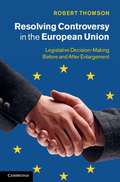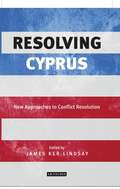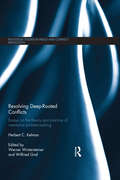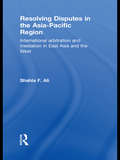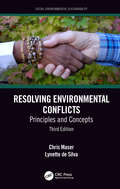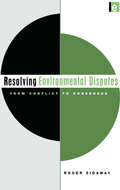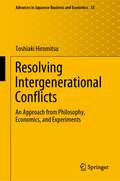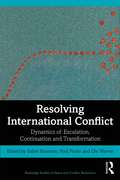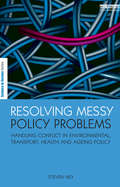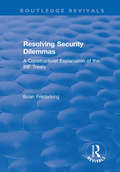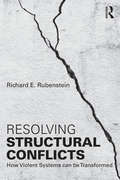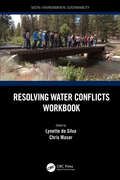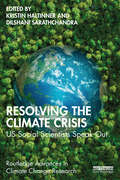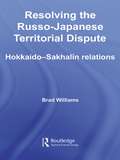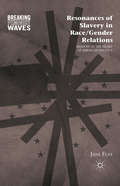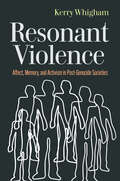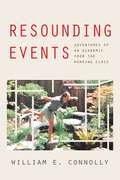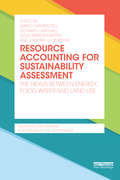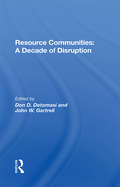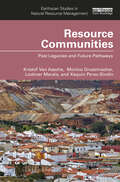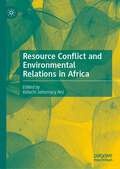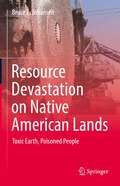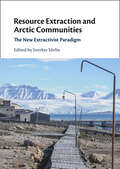- Table View
- List View
Resolving Controversy in the European Union
by Robert ThomsonHow does the EU resolve controversy when making laws that affect citizens? How has the EU been affected by the recent enlargements that brought its membership to a diverse group of twenty-seven countries? This book answers these questions with analyses of the EU's legislative system that include the roles played by the European Commission, European Parliament and member states' national governments in the Council of Ministers. Robert Thomson examines more than 300 controversial issues in the EU from the past decade and describes many cases of controversial decision-making as well as rigorous comparative analyses. The analyses test competing expectations regarding key aspects of the political system, including the policy demands made by different institutions and member states, the distributions of power among the institutions and member states, and the contents of decision outcomes. These analyses are also highly relevant to the EU's democratic deficit and various reform proposals.
Resolving Controversy in the European Union: Legislative Decision-Making Before and After Enlargement
by Robert ThomsonHow does the EU resolve controversy when making laws that affect citizens? How has the EU been affected by the recent enlargements that brought its membership to a diverse group of twenty-seven countries? This book answers these questions with analyses of the EU's legislative system that include the roles played by the European Commission, European Parliament and member states' national governments in the Council of Ministers. Robert Thomson examines more than 300 controversial issues in the EU from the past decade and describes many cases of controversial decision-making as well as rigorous comparative analyses. The analyses test competing expectations regarding key aspects of the political system, including the policy demands made by different institutions and member states, the distributions of power among the institutions and member states, and the contents of decision outcomes. These analyses are also highly relevant to the EU's democratic deficit and various reform proposals.
Resolving Cyprus: New Approaches to Conflict Resolution
by James Ker-Lindsay<p>Over the past fifty years the Cyprus Problem has come to be regarded as the archetype of an intractable ethnic conflict. Since 1964, the United Nations has been at the forefront of efforts to find a political solution to the dispute between the island’s Greek and Turkish communities. And yet, despite the active involvement of six Secretaries-General (U Thant, Kurt Waldheim, Javier Perez de Cuellar, Boutros Boutros Ghali, Kofi Annan and Ban Ki-Moon), every attempt to reach a mutually acceptable solution has failed. <p>Here, James Ker-Lindsay draws together new and original perspectives from the leading experts on Cyprus, including academics, policy-makers, politicians and activists. All have addressed one deceptively simple question: ‘Can Cyprus be solved?’ Resolving Cyprus presents a comprehensive overview of the Cyprus Problem from a variety of approaches and offers new and innovative ideas as to how to tackle one of the longest running ethnic conflicts on the world stage. This represents an essential contribution to the body of work on Cyprus, and will be required reading for all those following the debates surrounding the Cyprus problem.</p>
Resolving Deep-Rooted Conflicts: Essays on the Theory and Practice of Interactive Problem-Solving (Routledge Studies in Peace and Conflict Resolution)
by Herbert C. KelmanThis book is a collection of articles and essays by Professor Herbert C. Kelman, a leading figure in the conflict resolution community and one of the most influential peace researchers. Professor Kelman, a social psychologist, has been a pioneer of conflict resolution and peace research, and his work in conflict resolution has included a decades-long action research program on the Arab-Israeli conflict which has seen the development of Interactive Problem-Solving Workshops, an approach which has had a deep impact not only on research, but also on the practice of conflict resolution around the world, and especially in the Middle East. Focusing on Kelman’s conflict resolution-related work, this volume comprises an important collection of articles written by Kelman across his career as academic and practitioner. By bringing together these carefully selected articles the book offers a concise overview of the body of Kelman’s work and his intellectual biography. It traces the origins of the field of conflict resolution, the development of the study and practice of Interactive Problem Solving Workshops, and the wider challenges faced by conflict resolution research and practice. This book will be of much interest to students of peace and conflict studies, conflict resolution, psychology and IR in general.
Resolving Disputes Between Nations: Coercion or Conciliation?
by Martin PatchenThe use of force and coercion to settle disputes between nations is a central problem of our time. Martin Patchen considers the circumstances that lead nations to use coercive means in disputes with other nations and also examines the effectiveness of other means of resolving international disputes. Patchen examines conflict and cooperation as general social processes and builds on previous work to present an overall theoretical framework that encompasses the conflict situation, perceptions of the adversary, decision-making, bargaining, and interaction and influence sequences.
Resolving Disputes in the Asia-Pacific Region: International Arbitration and Mediation in East Asia and the West
by Shahla F. AliHow diverse cultures approach conflict in the context of the integration of global markets is a new arena for research and practice. To date, most of the research on international arbitration has focused exclusively on Western models of arbitration as practiced in Europe and North America. While such studies have accurately reflected the geographic foci of international arbitration practice in the late twentieth century, the number of international arbitrations conducted in East Asia has recently been growing steadily and on par with growth in Western regions. Resolving Disputes in the Asia-Pacific Region presents empirical research about the attitudes and perceptions of over 115 arbitrators, judges, lawyers and members of the rapidly expanding arbitration community in China, Hong Kong, Korea, Japan, Singapore, and Malaysia as well as North America and Europe. The book covers both international commercial arbitration and "alternative" techniques such as mediation, providing an empirical analysis of how both types of dispute resolution are conducted in the East Asian context. The book examines the history and cultural context surrounding preferred methods of dispute resolution in the East Asian region and sheds light on the various approaches to international arbitration across these diverse regions. This book will be of great interest to students and scholars of international arbitration and dispute resolution, comparative and Asian law, as well as anyone dealing with potential conflict in international business relationships in East Asia.
Resolving Environmental Conflicts: Principles and Concepts, Third Edition (Social Environmental Sustainability)
by Chris Maser Lynette de SilvaResolving a conflict is based on the art of helping people, with disparate points of view, find enough common ground to ease their fears, sheath their weapons, and listen to one another for their common good, which ultimately translates into social-environmental sustainability for all generations. Written in a clear, concise style, Resolving Environmental Conflicts: Principles and Concepts, Third Edition is a valuable, solution-oriented contribution that explains environmental conflict management. This book provides an overview of environmental conflicts, collaborative skills, and universal principles to assist in re-thinking and acting toward the common good, integrates a variety of new real-world conflicts as a foundation for building trust, skills, consensus, and capacity, and explains pathways to collectively construct a relationship-centric future, fostering healthier interactions with one another and the planet. The new edition illustrates how to successfully mediate actual environmental disputes and how to teach conflict resolution at any level for a wide variety of social-environmental situations. It adds a new chapter on water conflicts and resolutions, providing avenues to healthy, sustainable, and effective outcomes and provides new examples of conflicts caused by climate change with discussion questions for clear understanding. Land-use planners, urban planners, field biologists, and leaders and participants in collaborative environmental projects and initiatives will find this book to be an invaluable resource. University students in related courses will also benefit, as will anyone interested in achieving greater social-environmental sustainability and a more responsible use of our common natural resources for themselves and their children.
Resolving Environmental Disputes: From Conflict to Consensus
by Roger SidawayResolving Environmental Disputes presents detailed case studies from the key contemporary themes in resource management and environmental protection, such as: access to the countryside for recreation, sustainable forestry, pollution and risks to health, and coastal zone management. The book spans both theory and practice in assessing the relationship between public participation and mediation. It is structured around detailed case studies from Britain, the USA and the Netherlands, which are interspersed with chapters providing explanation and interpretation of the theoretical and practical issues involved. In reviewing the state of environmental conflict resolution, the author examines how and why conflicts occur and whether approaches to conflict resolution based on consensus building could be more widely applied.
Resolving Intergenerational Conflicts: An Approach from Philosophy, Economics, and Experiments (Advances in Japanese Business and Economics #33)
by Toshiaki HiromitsuThis book is an unprecedented consideration of the challenges of what we can do for generations yet to come. Many growing intergenerational conflicts of interest, such as climate change and fiscal sustainability, are the result of the historically new progress of increasing human power, and the resolution of those conflicts demands a new intergenerational ethic. The book offers fresh new ideas for resolving intergenerational conflicts through the exploration of an entirely new field, conceptualized in philosophy, developed in economics, and tested in experiments. In particular, this work develops the theory of intergenerational cooperation based on a new relationship of direct reciprocity between generations. From experimental results, the possibility of intergenerational cooperation through Kantian categorical imperative is shown. The book also examines the effectiveness of inviting representatives of future generations, which are called "imaginary future generations", into the deliberations for current policy decisions. The original Japanese edition of this book was awarded the 66th Nikkei Prize for Excellent Books in Economic Science. The prize was established in 1958 to contribute to the advancement of academics and knowledge in the fields of economics, management, and accounting, as well as to its general dissemination and application.
Resolving International Conflict: Dynamics of Escalation, Continuation and Transformation (Routledge Studies in Peace and Conflict Resolution)
by Ole Waever Isabel Bramsen Poul PoderResolving International Conflict rethinks the dynamics of conflict escalation and continuation by engaging with research from the wide range of subfields in this area. The book suggests a new framework for understanding conflict as a particular form of situation, interaction and tension. It shows how conflicts are shaped by varied dynamics relating to emotion, securitization, incentives, digital technology and violence; even attempts at monitoring, resolving or remembering conflicts may end up contributing to their escalation or continuation. Split into two sections, the first part focuses on the question of why and how conflicts escalate, while the second part analyses the continuation of conflict. The book features several case studies of conflict escalation and continuation - in Bahrain, Israel-Palestine, South Sudan, Northern Ireland and, most prominently, the case of the Syrian uprising and subsequent civil war. Throughout the book, and, in particular, in the conclusion, the consequences for conflict transformation are discussed. This work will be of much interest to students of conflict resolution, peace studies, war and conflict studies, security studies and international relations, in general.
Resolving Messy Policy Problems: Handling Conflict in Environmental, Transport, Health and Ageing Policy (The Earthscan Science in Society Series)
by Steven NeyOur lives increasingly take place in ever more complex and interconnected networks that blur the boundaries we have traditionally used to define our social and political spaces. Accordingly, the policy problems that governments are called upon to deal with have become less clear-cut and far messier. This is particularly the case with climate change, environmental policy, transport, health and ageing - all areas in which the tried-and-tested linear policy solutions are increasingly inadequate or failing. What makes messy policy problems particularly uncomfortable for policy makers is that science and scientific knowledge have themselves become sources of uncertainty and ambiguity. Indeed what is to count as a 'rational solution' is itself now the subject of considerable debate and controversy. This book focuses on the intractable conflict that characterises policy debate about messy issues. The author first develops a framework for analysing these conflicts and then applies the conceptual framework to four very different policy issues: the environment - focussing on climate change - as well as transport, ageing and health. Using evidence from Europe, North America and the Asia-Pacific, the book compares how policy actors construct contending narratives in order to make sense of, and deal with, messy challenges. In the final section the author discusses the implications of the analysis for collective learning and adaptation processes. The aim is to contribute to a more refined understanding of policy-making in the face of uncertainty and, most importantly, to provide practical methods for critical reflection on policy and to point to sustainable adaptation pathways and learning mechanisms for policy formulation.
Resolving Security Dilemmas: A Constructivist Explanation of the INF Treaty (Critical Security Series)
by Brian FrederkingThis title was first published 2000: The book applies constructivist arguments about culture, norms and identity to explain the superpower negotiations that produced the INF Treaty. It contributes to the constructivist research program in two ways. First, it develops a speech act model of social interaction to illustrate constructivist arguments and second, it develops a constructivist theory of security dilemmas that suggests practical ways to resolve them. The substantive conclusion of the book is that the dominant understanding of the end of the Cold War (the buildup argument) is not correct as it advocates policies that tend to perpetuate conflicts. Instead this book argues that the 'new thinking' explanation is more coherent and suggests improved practical ways to resolve other security dilemmas.
Resolving Structural Conflicts: How Violent Systems Can Be Transformed (Routledge Studies in Peace and Conflict Resolution)
by Richard E. RubensteinThis book analyses how certain types of social systems generate violent conflict and discusses how these systems can be transformed in order to create the conditions for positive peace. Resolving Structural Conflicts addresses a key issue in the field of conflict studies: what to do about violent conflicts that are not the results of misunderstanding, prejudice, or malice, but the products of a social system that generates violent conflict as part of its normal operations. This question poses enormous challenges to those interested in conflict resolution, since the solution to this problem involves restructuring social, political, and cultural systems rather than just calling in a mediator to help people arrive at an agreement. This study breaks new ground in showing how local conflicts involving crime, police, and prisons; transnational conflicts involving religious terrorism by groups like ISIS; and international conflicts involving Great Power clashes are all produced in large part by elite-driven, exploitative or oppressive social structures. It also presents new ideas about the implications of this ‘structural turn’ for the practice of conflict resolution, emphasizing the need for conflict resolvers to embrace a new politics and to broaden their methods far beyond traditional forms of facilitation. Written by a leading scholar, this book will be of much interest to students of conflict resolution, peace studies, war and conflict studies, sociology, political science and international relations in general.
Resolving Water Conflicts Workbook (Social-Environmental Sustainability)
by Chris Maser Lynette De SilvaThis book works to build trust, consensus, and capacity to enhance understanding through a water conflict management framework designed to bolster collaborative skills. Built on case-studies analysis and hands-on real-life applications, it addresses issues of water insecurity of marginalized systems and communities, global water viability, institutional resilience, and the inclusion of faith-based traditions for climate action. The authors assess the complexities of climate challenges and explain how to create sustainable, effective, and efficient water approaches for an improved ecological and socioeconomic future within the UN's Sustainable Development Goals.
Resolving the Climate Crisis: US Social Scientists Speak Out (Routledge Advances in Climate Change Research)
by Kristin Haltinner Dilshani SarathchandraThis book brings together a team of renowned social scientists to ask not why climate change is happening, but how we might learn from its human dimensions to raise public and political will to fight against the climate crisis.Despite efforts for mitigation, global emission levels continue to increase annually and the world’s wealthiest nations, including all of the G20 countries, have failed to meet their Paris Climate Goals. In the absence of political will, many have called for individuals to act on climate change by mitigating their own carbon footprint through having fewer children, driving less, using LED lightbulbs, or by becoming vegetarians. While compelling, individual lifestyle changes on this scale are unlikely to prevent climate disaster. Resolving the Climate Crisis presents informed solutions for social change that center human behavior and emotions, political systems, and societal structures. Across a series of concise and accessible chapters, authors explore potential solutions to climate change, addressing topics including Indigenous ecologies, LGBTQ+ community engagement, renewable energy technologies, and climate justice. Their expert engagement with the social and behavioural sciences makes this book not only an essential handbook of climate change solutions but also an innovative model for public-facing social science scholarship.Resolving the Climate Crisis will be an essential resource for students and researchers of climate change, as well as policy makers working to develop meaningful strategies for combatting the climate crisis.
Resolving the Russo-Japanese Territorial Dispute: Hokkaido-Sakhalin Relations (Nissan Institute/Routledge Japanese Studies #10)
by Brad WilliamsThe unresolved territorial dispute between Japan and Russia over the South Kuril Islands/Northern Territories remains the largest obstacle to concluding a peace treaty and fully normalising bilateral relations between the two nations. This book traces the evolution of transnational relations between subnational public authorities in Hokkaido and Sakhalin, examining the interrelationship between these ties and the Russo-Japanese territorial dispute. The book investigates why the development of Hokkaido-Sakhalin relations has failed to create, at the subnational level, an environment conducive to resolving (kankyo seibi) the South Kuril Islands/Northern Territories dispute. Brad Williams suggests that kankyo seibi has not worked primarily because Russia’s troubled transition to a liberal democratic market economy has manifested itself in ways that have ultimately increased the South Kuril Islands’ intrinsic and instrumental value for the Sakhalin public and regional elite. This in turn has limited the impact from the twin transnational processes of cultural and economic exchange in alleviating opposition to the transferral of these disputed islands to Japan. Drawing upon a wealth of primary and secondary sources from both countries, this book utilises levels of analysis and an analytical framework that incorporates national and subnational, as well as governmental and non-governmental forces to discuss a relatively unexplored aspect of Russo-Japanese relations. As such, Resolving the Russo-Japanese Territorial Dispute will appeal to students and scholars of Asian politics, international relations and post-communist states.
Resonances of Slavery in Race/Gender Relations: Shadow at the Heart of American Politics
by Jane FlaxJane Flax argues that a reciprocal relationship exists between unconscious processes and race/gender domination and that unless we attend to these unconscious processes, no adequate remedy for the malignant consequences of our current race/gender practices and relations can be devised. Flax supports her arguments using a variety of sources.
Resonant Violence: Affect, Memory, and Activism in Post-Genocide Societies (Genocide, Political Violence, Human Rights)
by Kerry WhighamFrom the Holocaust in Europe to the military dictatorships of Latin America to the enduring violence of settler colonialism around the world, genocide has been a defining experience of far too many societies. In many cases, the damaging legacies of genocide lead to continued violence and social divisions for decades. In others, however, creative responses to this identity-based violence emerge from the grassroots, contributing to widespread social and political transformation. Resonant Violence explores both the enduring impacts of genocidal violence and the varied ways in which states and grassroots collectives respond to and transform this violence through memory practices and grassroots activism. By calling upon lessons from Germany, Poland, Argentina, and the Indigenous United States, Resonant Violence demonstrates how ordinary individuals come together to engage with a violent past to pave the way for a less violent future.
Resounding Events: Adventures of an Academic from the Working Class
by William E. ConnollyWinner, David Easton Award for Political Theory, 2023In Resounding Events, one of the world’s preeminent political theorists reflects on a career as an academic hailing from the working class. From youthful experiences of McCarthyism, to the resurgence of white evangelicalism, to the advent of aspirational fascism and the acceleration of the Anthropocene, Connolly traces a career spent passionately engaged in making a more just, diverse, and equitable world. He surveys the shifting ground upon which politics can be pursued; and he discloses how to be an intellectual in universities that today do not encourage that practice.Far more than a memoir, Resounding Events probes the concerns that have animated Connolly’s work across more than a dozen books by tracing the bumpy imbrications of event, memory and thinking in intellectual life. Connolly experiments with ways to capture various voices that mark a self at any time. An event, as he elaborates it, is what disturbs or inspires thinking as it activates layered sheets of memory. A memory sheet itself assembles recollections, dispositions organized from the past, and vague remains that carry efficacies.Resounding Events shows how resonances between event and memory can help forge new concepts better adjusted to an emergent situation. Addressing tensions between working class experience and norms of the academy, his father’s coma, antiwar protests, the growing disaffection of the white working class, the neoliberalization of the university, climate denialism, and his sister’s experience with workers shifting to Trump, Connolly shows how engaged intellectuals become worthy of the events they encounter.
Resource Accounting for Sustainability Assessment: The Nexus between Energy, Food, Water and Land Use (Routledge Explorations in Sustainability and Governance)
by Mario Giampietro Richard J. Aspinall Jesus Ramos-Martin Sandra G.F. BukkensThe demands placed on land, water, energy and other natural resources are exacerbated as the world population continues to increase together with the expectations of economic growth. This, combined with concerns over environmental change, presents a set of scientific, policy and management issues that are critical for sustainability. Resource Accounting for Sustainability Assessment: The nexus between energy, food, water and land use offers an approach for multi-scale, integrated assessment of this nexus. It presents a comprehensive and original method of resource accounting for integrated sustainability assessments. The approach is illustrated with three detailed case studies: the islands of Mauritius, the Indian state of Punjab, and the energy economy of South Africa. The relationships between flows of goods, services and materials in these case studies offer valuable insights. The book provides a much needed quality control on the information used in deliberative processes about policy and planning activities. This innovative book will be of interest to researchers, students and practitioners in the fields of sustainability science, international development, industrial ecology, sustainable resource management, geography and ecological economics.
Resource Communities: A Decade Of Disruption
by Don D Detomasi J. W. Gartrell John W GartrellThis volume consists of eleven original papers that survey the state of the art in research and public policy regarding specific problems and opportunities confronted by resource communities. The papers are international in scope, dealing with the experiences of resource communities in four nations—Canada, Norway, the United Kingdom, and the United
Resource Communities: Past Legacies and Future Pathways (Earthscan Studies in Natural Resource Management)
by Lochner Marais Kristof Van Assche Monica Gruezmacher Xaquin Perez-SindinThis book provides an innovative approach to understanding the governance of resource communities, by showcasing how the past and present informs the future. Resource communities have complicated relationships with the past, and this makes their relationship with the future, and the future itself, also complicated. The book digs deeply into the myriad legacies left by a history of resource extraction in a community and makes use of interdisciplinary and transdisciplinary perspectives to understand the complex issues being faced by a range of different communities that are reliant on different types of resources across the world. From coal and gold mining, to fishing towns and logging communities, the book explores the legacies of boom and bust economies, social memory, trauma and identity, the interactions between power and knowledge and the implications for adaptive governance. Balancing conceptual and theoretical understandings with empirical and practical knowledge of resource communities, natural resource use and social-ecological relationships, the book argues that solutions for individual communities need to be embraced in the community and not just in the perspectives of visiting experts. Linking the past, present and futures of resource communities in a new way, the book concludes by providing practical recommendations for breaking open dependencies on the past, including deepening awareness of the social, economic and environmental contexts, establishing strong governance and developing community strategies, plans and policies for the future. This book will be of great interest to students and scholars of natural resource governance and management, extractive industries, environmental policy, community planning and development, environmental geography and sustainable development, as well as policymakers involved in supporting community development in natural resource-dependent communities across the world.
Resource Conflict and Environmental Relations in Africa
by Kelechi Johnmary AniThe book discusses the failure of many African governments in providing the social needs of the masses, thereby placing the citizenry on the desperate quest for economic resources. Unfortunately, in many African States, mineral resources are owned, explored and marketed by the machinery of the state. The problem arises when the masses begin to challenge state access and ownership of resources that are domiciled within their ancestral land, communities, and constituencies. Often the challenge and resistance to state ownership of resources is generated by communal or group sense of exploitation, negligence and widespread poverty in the face of high resource endowment and waste by the government officials. Paradoxically, in Niger Delta of Nigeria, as discussed in the book, the state has unleashed unlimited might upon all social groups and agitators, thereby leading to the increased act of taking arms by such groups. When the informal resource agitators succeed in arming themselves, they begin to demand social and environmental justice, thereby leading to mass armed conflict between them and the government security agencies. Sometimes, the confrontation could be between them and other rival local resource actors in the informal sector of their country’s economy bearing in mind that the resources within their jurisdiction have become the central determinant of national commonwealth. It is at that state of desperado to control access, extraction and sale of natural resources in a State, by different armed groups that the process of natural resources extraction qualifies as the most visible cause of conflicts and crises around the African continent that is the centrepiece of the book. This is quite understandable given that mineral resource is a gift of nature; and nature is that phenomenon that every human, group and nation claim to represent, or, believe to represent them.
Resource Devastation on Native American Lands: Toxic Earth, Poisoned People
by Bruce E. JohansenThis book focuses on the toxic legacy of Native North America, which is pervasive but largely invisible to most non-Native peoples. Many toxic sites are located in out-of-the-way rural areas largely forgotten by the majority of America, but which nonetheless have supplied its industries with the rudiments of manufacturing for the better part of a century before being closed and cast aside. Thousands of contaminated sites exist in the United States due to dumped, left out, or otherwise improperly managed hazardous waste. These sites include manufacturing facilities, processing plants, landfills, and mining sites. Based on the 1980 Comprehensive Environmental Response, Compensation and Liability Act (CERCLA), the US Environmental Protection Agency (EPA) cleans up these so-called Superfund sites, of which roughly 40 percent are located in Native country.The book links present-day Native American cultural and economic revival to a fundamental struggle to restore the health of both Native peoples and their homelands. It links past and present with a sense of Native Americans’ perceptions of nature and the sacred land. By doing so, it also provides the majority society with an example to emulate as we emerge, by necessity, from the age of fossil fuels into a sustainable energy paradigm. This makes the book a must-read for students, scholars, and researchers of Native American studies, US politics, environmental studies, public policy, as well as policy-makers interested in a better understanding of the environmental devastation of Native land and its consequences.
Resource Extraction and Arctic Communities: The New Extractivist Paradigm
by Sverker SörlinFor decades, a post-Cold War narrative heralded a 'new Arctic', with melting ice and snow and accessible resources that would build sustainable communities. Today, large parts of the Arctic are still trapped in the path dependencies of past resource extraction. At the same time, the impetus for green transitions and a 'new industrialism' spell opportunities to shift the development model and build new futures for Arctic residents and Indigenous peoples. This book examines the growing Arctic resource dilemma. It explores the 'new extractivist paradigm' that posits transitioning the region's long-standing role of delivering minerals, fossil energy, and marine resources to one providing rare earth elements, renewable power, wilderness tourism, and scientific knowledge about climate change. With chapters from a global, interdisciplinary team of researchers, new opportunities and their implications for Arctic communities and landscapes are discussed, alongside the pressures and uncertainties in a region under geopolitical and environmental stress.

